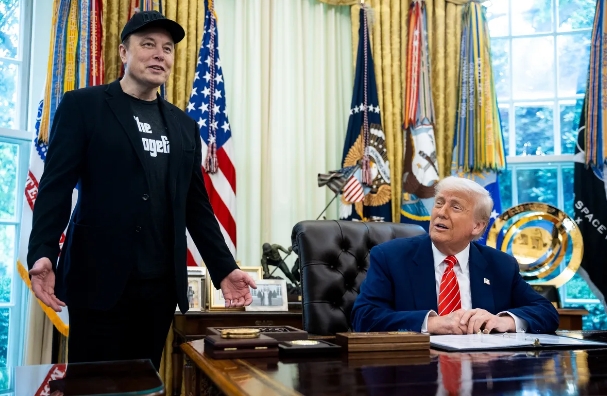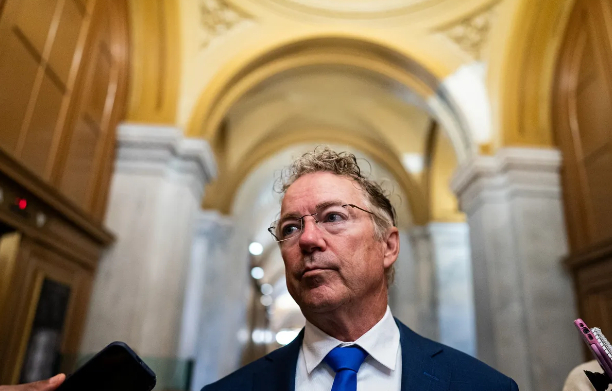Elon Musk Blasts Trump's "Big Beautiful Bill" as Budget-Busting "Abomination"
In a striking turn of events, Elon Musk, a prominent ally of President Donald Trump, has publicly condemned the administration's signature tax bill, labeling it a budget-busting "abomination." This sh

In a striking turn of events, Elon Musk, a prominent ally of President Donald Trump, has publicly condemned the administration's signature tax bill, labeling it a budget-busting "abomination."
This sharp criticism from the tech titan comes at a pivotal moment as Trump works to rally support among hesitant Republican senators to secure passage of the $3.9 trillion tax-cut and debt ceiling package. Musk's outspoken stance could complicate the bill's journey through Congress, potentially delaying or derailing its enactment.
"This massive, outrageous, pork-filled Congressional spending bill is a disgusting abomination," Musk declared in a recent social media post. "Shame on those who voted for it." The remarks follow his departure from a temporary role leading the administration's Department of Government Efficiency initiative, aimed at slashing federal spending. His exit from this position, coupled with a reported decline in Tesla's electric vehicle sales, underscores the tension between Musk's business interests and the administration's fiscal policies.
Background on Trump's Tax Bill
The tax bill, passed by the House, is a cornerstone of Trump's economic agenda, promising significant tax cuts for individuals and corporations. However, it comes with a hefty price tag: forecasts suggest it will reduce federal revenue by approximately $4 trillion over the next decade, adding $2.5 trillion to the federal deficit, even after accounting for deep cuts to programs like Medicaid and food stamps. The legislation also includes a contentious debt ceiling increase, a measure deemed necessary by Republican leaders to avoid a potential default as early as August.
A key feature of the bill is the phasing out of Biden-era tax incentives for electric vehicle (EV) purchases and clean energy production—policies that have been critical to companies like tesla. This rollback has drawn sharp criticism from Musk and his team, who argue it threatens America's energy independence and economic competitiveness.
Musk's Criticisms: A Finance-Focused Perspective
Musk's critique of the tax bill is multifaceted, rooted in both fiscal responsibility and industry-specific concerns. His primary objection centers on the bill's deficit spending, which he views as reckless and unsustainable. The Congressional Budget Office and independent economists largely align with this concern, projecting that the legislation will balloon the national debt at a time when fiscal conservatives are already sounding the alarm.
Beyond the macroeconomic implications, Musk has zeroed in on provisions directly impacting Tesla. The elimination of EV tax credits, which have historically incentivized consumer adoption of electric vehicles, could dampen demand for Tesla's products. Tesla Energy, the company's solar and battery division, echoed this sentiment in a social media post: "Abruptly ending the energy tax credits would threaten America's energy independence and the reliability of our grid." Musk amplified this message, signaling his broader disapproval of the bill's energy policy direction.
Additionally, Musk has clashed with Trump on trade policy, notably advocating for lower tariffs during a Tesla earnings call earlier this year. The tax bill's alignment with Trump's broader protectionist agenda—potentially increasing costs for imported goods and materials—could further strain Tesla's supply chain and production costs, adding another layer to Musk's dissent.
Political Fallout and Legislative Challenges
Musk's criticism has reverberated through Washington, emboldening fiscal hawks within the Republican Party. Senator Mike Lee of Utah, a known deficit hawk, endorsed Musk's stance, urging the Senate to "make this bill better." At least 16 GOP senators have expressed reservations about the legislation, with figures like Rand Paul of Kentucky vowing to oppose it outright due to its debt ceiling hike and deficit expansion. "I'm just not for that. That's not conservative," Paul said on CNBC, a sentiment that resonates with Musk's fiscal critique.

Senator Rand Paul
The White House, however, remains steadfast. Press Secretary Karoline Leavitt dismissed Musk's remarks, stating, "The President already knows where Elon Musk stood on this bill. It doesn't change the president's opinion. This is one big, beautiful bill and he's sticking to it." Treasury Secretary Scott Bessent and Senate Majority Leader John Thune have similarly defended the legislation, emphasizing its potential to spur economic growth—a claim contested by most outside economists.
The bill's fate now hinges on Senate negotiations, where Republican leaders must secure 51 votes in a chamber divided between moderates and conservatives. Thune acknowledged the challenge: "We've got to get to 51, so we'll figure out the path forward over the next couple of weeks." Trump is set to meet with the Senate Finance Committee to address these concerns, but Musk's high-profile opposition could stiffen resistance among key holdouts.
Economic Implications of the Tax Bill
The financial stakes of the tax bill are immense. Proponents argue that its tax cuts will stimulate investment and growth, potentially offsetting the revenue loss through a stronger economy. The White House has leaned heavily on this narrative, asserting the bill will "pay for itself." Yet, this optimistic forecast is at odds with mainstream economic analysis, which warns of a significant debt burden that could constrain future government spending and increase borrowing costs.
For businesses like Tesla, the bill presents a double-edged sword. While corporate tax cuts could provide short-term relief, the loss of EV and clean energy incentives threatens long-term growth in a sector Musk has championed. The broader economic ripple effects—higher deficits, potential inflation, and shifts in consumer spending—could also reshape the competitive landscape for American firms.
Individuals, meanwhile, face a mixed bag. The bill's tax cuts may boost disposable income for some, but the accompanying reductions in safety-net programs could disproportionately harm lower-income households. This trade-off has fueled debate about the bill's fairness and sustainability, a tension Musk's criticism has brought into sharper focus.
A Defining Moment
Elon Musk's public rebuke of Trump's tax bill marks a rare fracture in their alliance, highlighting deep-seated concerns about fiscal policy and its real-world impact. As a business leader with a vested interest in energy innovation, Musk's perspective carries weight, amplifying the voices of fiscal conservatives and industry stakeholders alike. Whether his criticism sways the bill's trajectory remains uncertain, but it has undeniably elevated the stakes of an already contentious legislative battle.
Looking ahead, the tax bill's passage—or failure—will shape the U.S. economic landscape for years to come. For Musk and Tesla, it's a fight for the future of clean energy incentives and fiscal prudence; for Trump, it's a test of political capital and economic vision. As the Senate deliberates, the clash between these two titans underscores a broader question: can America afford the cost of this "beautiful bill," or will it prove to be the abomination Musk decries?
Disclaimer: The views in this article are from the original Creator and do not represent the views or position of Hawk Insight. The content of the article is for reference, communication and learning only, and does not constitute investment advice. If it involves copyright issues, please contact us for deletion.